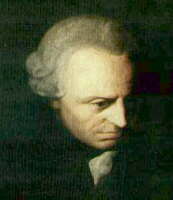|
Great Books III Fall
2019
Foundations of the
Metaphysics of Morals - Immanuel Kant
"Is it possible to be
both Moral and Free?"
|
|
Reading/Discussion Schedule
October 25 :
Introduction, Preface, First Section; October 29: pp. 22-44;
November 1: pp.
44-63; November 5: Third Section
|
| Reading/Discussion Prompts
October 25
- Where would you go in order to find the "common" knowledge
of morals?
- What terms/ideas should be included in a work on ethics?
- What is "good intelligence"?
- According to Kant, what is morality based upon?
October 29
- Be prepared to cite an example of both a categorical and a
hypothetical imperative.
- Be prepared to discuss the four problems of duty on pp.
38-40.
- Where does the "transition" (as promised in the title) occur
in section 1?
- Does declaring oneself a conscientious objector constitute
an act of pure duty?
November 1
- Be prepared to come to class and draw a picture of the realm of
ends. We will divide into groups for this exercise.
- Which of the following belong to the realm of ends: God,
Satan, Adam, Eve?
- Is knowledge of good and evil consistent with a good will?
- Is God part of the heteronomy of will?
- How does the idea of "sovereign" compare between Kant and
Rousseau?
November 5
- Does Kant require the existence of God for morality to
occur in humans?
- Define, in your own words, the major philosophical areas
of this work.
- Define the transitions.
- How does Kant establish the existence of the synthetic
categorical imperative?
|

|
|
|
|
|
| |
 |
|
|
| |
|
|
